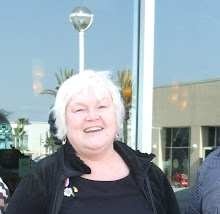Wednesday, December 30, 2009
___isms
"The issue many forget is that “learning” is not one thing…it is a multi-layered word that tends to get treated as if it were just one thing…and it’s not. It is multi-facetted and that is why developing new models for “learning” is so difficult…there are too many levels for one school of thought or one model to do it all."
I agree with him, even though I had not yet gotten around to thinking of the different approaches being appropriate for specific types of learning. This makes good sense to me. I also suspect that different instructors and different content areas may require different ___isms. Having a tool box of ideas on how to construct classes is probably more important than subscribing to one particular way of thinking in all instances. I think that might have been Bill Kerr's point that __isms are filters.
Maybe we will eventually get to the point that learners pick the instructor who fits best with the kind of learning that is most effective for the learners, not who knows the content area the best. I'll have to think about that for a while.
Wednesday, December 16, 2009
How people learn
I also suspect that different learning theories work on different learners at different times in their lives. If one learns a language as a toddler, then does not use that language, it becomes extinguished to a great degree. But learning that language again as an adult is easier than if the learner never had learned it at all.
I used to teach English to high school juniors. I was especially annoyed by the writing error of “a lot” being written without a space. So I invented the “A Lot Cheer” as a way in incorporate physical and musical intelligences into extinguishing this error. I taught the cheer at the beginning of the school year. Every time I caught a student making that error, he or she had to lead the class in the cheer. I had hoped that this punishment would be sufficient to make them aware of their mistakes and stop repeating them. During the semester, I began to notice self-editing where students would write a lot without the space (which my computer keeps correcting); later they would draw a line through it and spell it correctly. On the semester final, I asked them in multiple choice questions which words were misspelled. Almost all of the students identified that the “alot” was a misspelling, but about one fourth of them misspelled it in their essay test. I suspect that composing comes from one part of the brain, and editing comes from another, something that Behaviorism does not take into consideration.
